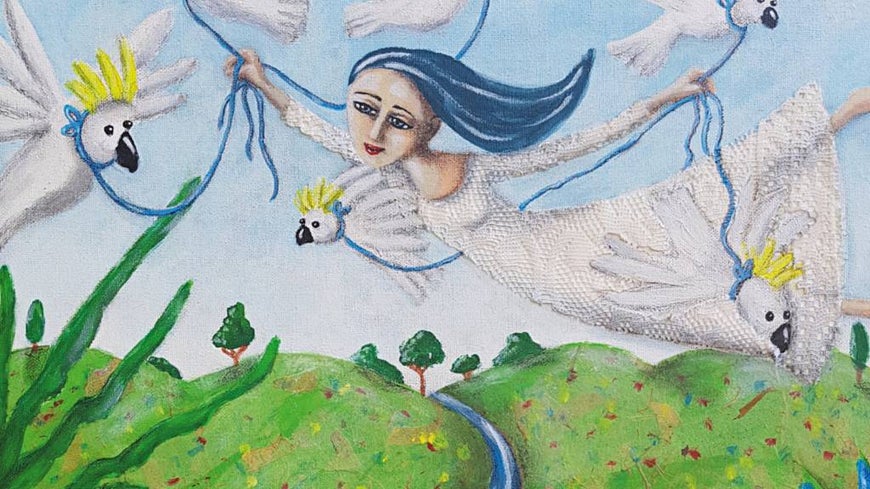How to calm the mind of the racing thoughts of anxiety

Written by Ellouise Bailey for Australian Seniors. Here, she interviews Bev Aisbett on her experiences with anxiety, and how to manage it.
What is your own experience with anxiety?
Bev: My anxiety arked up when I decided to go freelance as an illustrator in 1991, after years in employment. Although I had a lot of regular gigs, I had this gnawing feeling of being unsettled and a huge sense of self-doubt. I didn’t realise at the time how much it would impact me.
Managing the symptoms in the early stages can be debilitating. I would be wrenched awake at night with this dropping feeling in my gut. In retrospect it was me telling myself I was going to fail and that I was nothing. I came to learn that sort of thinking is an attitude that goes with anxiety. Despite this I went to work each day. If you give in to it, it takes over and then you identify with it. You need to feel the fear and do it anyway, I think that carries a lot of merit.
What causes anxiety?
Bev: I think at the heart of it, it’s a fractured relationship with the self that goes way back. Working towards recovery means you need to understand how your inner critic came to the forefront.
You go into survival mode, which goes back to our ancestors who had to always be on the lookout. Nowadays, even if there is no obvious danger, we can make up threats in our own minds. Your mind starts constantly alerting you to what might be going wrong.
How would you describe anxiety to someone trying to help a loved one?
Bev: Imagine you had a gun to your head. That’s how you would feel. It’s very powerful and it’s not something that someone can just snap their fingers and pop out of. There are also physical feelings like sweating, stomach churning, chaotic thoughts, difficulty concentrating and not being able to manage things.
The thing is not to be pulled in by their anxious thinking. Just hold a place of calm for that person. It’s not a contest for who has the worst situation going on. They just need comfort from you. It’s important that we don’t feed the anxiety, just help them to move out of it.
How can you change your thought patterns?
Bev: A big part of the process is learning how to soothe yourself rather than terrorise yourself. If you let your mind dwell on all the terrible, awful and unbearable things, you’re going to be starting World War III in your mind. The way to address that and work through it is to change the story you’re telling yourself: ‘It will pass, I’ll be OK, nothing bad is actually happening.’
Another aspect is to acknowledge the part of yourself that is dealing with this crippling fear. Imagine you’re speaking to a little kid, if they were experiencing fear you wouldn’t want to add to that fear, you would give them support and comfort.
What advice would you give your younger self about dealing with anxiety?
Bev: The best piece of advice is that you don’t have to make such a big deal out of it. It’s not the end of the world. If you label it as a mental illness, people can really take on that identity. The psychologist I first saw when I was going through this said that I was the most frightened person she’d ever seen. I didn’t want that identity, it wasn’t helpful. I started to identify with that and started to think that I must be in a really bad way. She was acknowledging the struggle but it was not the right thing to say in that moment.
How do you get your life back in order after suffering anxiety?
Bev: Get your thinking right by looking at how you talk to yourself about your fears. You’re not on a crashing plane. Stop imagining the worst case scenario and start thinking optimistically. There’s always hope. Little did I know when I was completely overwhelmed on that first day, that I would be OK and everything would work out. The first thing is being gentle and kind of your thoughts.
Bev’s 5 top tips for overcoming anxiety
Be Mindful
Think and live in the present. Forget all that speculation about what might happen.
Take Charge
If your thoughts get out of control you need to pull them back. Even just saying to yourself, “I’m getting caught up in the drama,” will give those thoughts less power.
Breathe Deeply
Come back to your breathing and focus on one thing. I find yoga and meditation really helpful for this.
Get Moving
If you’re really agitated go for a walk or do something physical and bring that energy back into your body. Anxiety is not a permanent state, just let it move through you.
Stay Calm
Someone who has had anxiety is more vulnerable to experiencing it again. Look after yourself and do things to keep yourself nice and calm.
Managing anxiety can be done, just make sure you are gentle with yourself, and non-judgemental. Always seek professional help if you feel you are struggling, and aren’t coping anymore.
Bev is the author of 11 self-help books about anxiety, depression and related issues, including 30 Days 30 Ways to Overcome Anxiety (HarperCollins).
Bev also painted the work used as this image for this article. It’s called Cockatoo Ascension, which she says depicts “rising above” and floating free of burdens. Bev says, “My dog regularly features as my muse – the ‘black dog’ (a symbol of depression) as both a friend and a reminder to keep my thoughts uplifted. The rural setting features my hometown of Alexandra in country Victoria and is the home of many cockatoos!”
22 Feb 2021